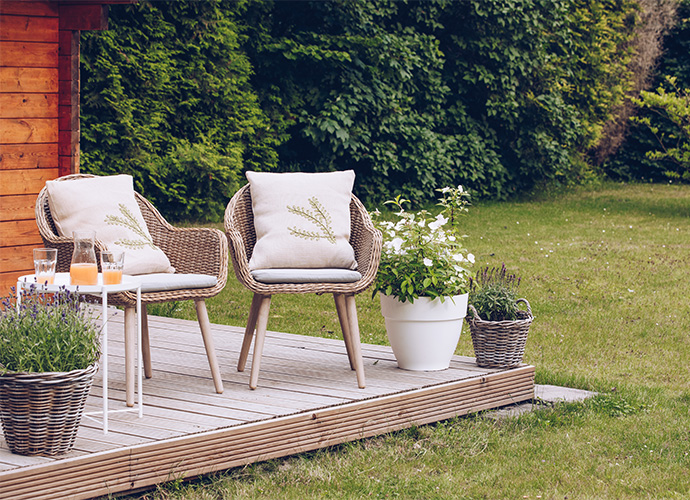With the warmer weather just around the corner, it’s the perfect time to get your outdoor space ready for summer. One of the key areas to focus on is your decking. In this article, we’ll guide you through the steps to clean and maintain your decking, ensuring it stays fresh and vibrant throughout the season. We’ll also provide advice on which chemicals to avoid, as well as treatments and protection to prolong the life of your decking.

Clear your decking.
Before you can get started with the cleaning process, it’s important to clear your decking of any furniture, plant pots, and other items. This will not only make cleaning easier but will also help you identify any areas that may need extra attention.
Sweep and remove debris.
Use a soft brush or broom to sweep away any leaves, dirt, and debris from the surface of your decking. This will help to prevent the growth of mould and algae, which can lead to slippery surfaces and cause the wood to rot over time.
Choose the right cleaner.
When it comes to cleaning your decking, it’s crucial to choose a cleaner specifically designed for the type of material your decking is made from. Avoid using bleach or chlorine-based cleaners, as these can damage the wood and strip away its natural oils. Instead, opt for a dedicated decking cleaner or a mild detergent mixed with water. Always follow the manufacturer’s instructions for the correct dilution and application method.
Apply the cleaner.
Using a garden sprayer, watering can or a soft brush, apply your chosen cleaner evenly across the decking. Be sure to get into all the nooks and crannies to ensure a thorough clean. Leave the cleaner to work for the recommended time, typically 10-15 minutes, allowing it to break down any dirt, algae, or mould.
Lightly scrub and rinse.
Once the cleaner has had time to work, use a soft brush or mop to scrub the decking, paying particular attention to any heavily soiled or stained areas. Rinse thoroughly with a garden hose or pressure washer, taking care not to damage the wood with excessively high pressure. Allow the decking to dry completely before moving onto the next step.
Inspect and repair.
Now that your decking is clean and dry, take the time to inspect it for any signs of damage or wear. Replace any loose or damaged boards and secure any protruding nails or screws. If your decking has been previously stained or painted, you may need to lightly sand the surface to remove any peeling or flaking finishes.
Treat and protect.
To prolong the life of your decking and keep it looking its best, it’s important to apply a treatment or protective coating. Options include:
- Decking oil: Decking oils penetrate the wood, nourishing and protecting it from the elements. They help to prevent the wood from drying out and warping, and also offer some protection against UV rays.
- Decking stain: Stains provide a more opaque finish and are available in a range of colours. They not only protect the wood but can also enhance the natural grain and appearance of your decking.
- Decking paint: For a more dramatic transformation, decking paint is available in a wide variety of colours and finishes. It provides a durable, weather-resistant coating that can help to hide imperfections and signs of wear.
Whichever option you choose, be sure to follow the manufacturer’s instructions for application and drying times.
Regular maintenance.
To keep your decking looking great and to extend its lifespan, it’s important to perform regular maintenance. Sweep your decking regularly to prevent the build-up of dirt and debris and clean it thoroughly at least once a year. Inspect and repair any damage as needed and reapply your chosen protective treatment every 1-2 years, or as recommended by the manufacturer.
Preventative measures.
To further protect your decking, consider implementing some preventative measures:
- Use plant pot saucers: Place saucers underneath plant pots to prevent water and soil from staining your decking.
- Install guttering and downspouts: Ensure that your guttering and downspouts are in good working order and direct water away from your decking to prevent excess moisture, which can lead to rot and mould growth.
- Be mindful of barbecues: When using a barbecue on your decking, place a protective mat or tray beneath it to catch any grease or food spills that could stain the wood.
- Remove snow and ice: In the winter months, promptly remove snow and ice from your decking to prevent damage from moisture and freezing temperatures.
By following these simple steps, you can ensure your decking stays clean and well-maintained, ready for you to enjoy throughout the warmer weather. Remember to use the appropriate cleaning products, treatments, and protective coatings, and perform regular maintenance to prolong the life of your decking. With a little effort, your outdoor space will be the perfect place to relax and entertain all summer long.






